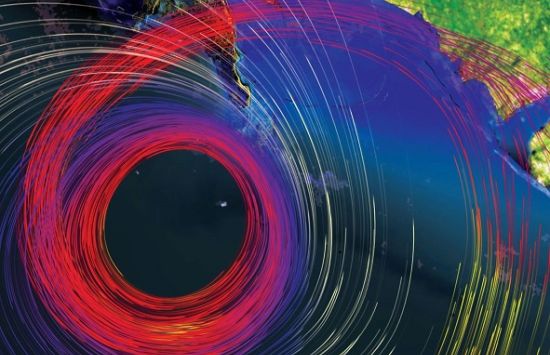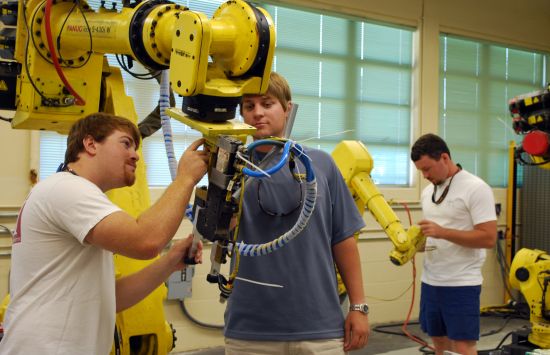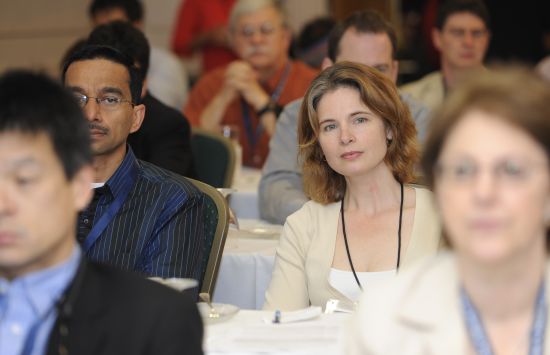
Credit: Jurgen Schulze, University of California, San Diego
The definition of a "discipline" and the varieties of cross-disciplinary research — from multidisciplinary, to interdisciplinary, to transdisciplinary — are constantly evolving. Although there is not always agreement on these definitions, it is clear that areas of research are dynamic: continually emerging, melding and transforming. What is considered interdisciplinary today might be considered disciplinary tomorrow.
A working definition of interdisciplinary research can be found in the U.S. National Academies of Sciences, Engineering and Medicine's report, Facilitating Interdisciplinary Research:
Interdisciplinary research:
- Integrates information, data, techniques, tools, perspectives, concepts or theories from two or more disciplines or bodies of specialized knowledge.
- Can be done by teams or by individuals.
- Advances fundamental understanding or solves problems whose solutions are beyond the scope of a single discipline or area of research practice.

1. Solicited interdisciplinary research
Numerous NSF programs are designed to be explicitly interdisciplinary. Solicitations, which invite proposals to these programs, are posted on the NSF website. NSF's interdisciplinary research programs broadly fall under the three categories below:
Many of NSF's interdisciplinary programs involve several of NSF's directorates. Examples of these programs include:
- BIGDATA
- Building Theoretical Foundations for Data Sciences (TRIPODS)
- Coastlines and People
- Dynamics of Integrated Socio-Environmental Systems
- Ecology and Evolution of Infectious Diseases
- Growing Convergence Research
- Research on Emerging Technologies for Teaching and Learning
- Smart and Connected Communities
NSF develops funding portfolios that focus on complex societal challenges of national interest, often in collaboration with other federal agencies. Examples of these programs include:
Many of the centers funded by NSF bring together interdisciplinary research teams. Examples of NSF's center competitions include:

2. Unsolicited interdisciplinary research
NSF invites interdisciplinary proposals that are not targeted by a program solicitation, as long as they are appropriate for NSF support. Depending on its focus, such a proposal may:
- Be reviewed by a single core program.
- Be co-reviewed by more than one program.
- Extend beyond the scope of any current program.
See "How to prepare an interdisciplinary proposal" to learn how to submit an unsolicited interdisciplinary research proposal.

3. Education and training
NSF has numerous programs supporting the development of the next generation of researchers. The support from these programs is in addition to the support for undergraduates, graduate students and postdoctoral researchers to conduct research on NSF-funded grants. Examples of these programs include:

4. Workshops, conferences and symposiums
NSF sponsors forums designed to promote interdisciplinary perspectives and research.
Preparing an unsolicited interdisciplinary proposal?
Follow the guidance below for how to submit a proposal with ideas that are in novel or emerging areas extending beyond any particular NSF program.
1. Prepare a summary of your proposal ideas.
Develop a short 1–2 paragraph description of your proposal idea that you can send by email and discuss with NSF staff. Make sure your idea is appropriate for NSF funding by viewing the Programs and Funding Opportunities section of the agency's Proposal and Award Policies and Procedures Guide.
2. Contact an NSF program officer.
The program officer you contact will provide guidance on how and where to submit your proposal. To find an appropriate program officer, consider these options in the following order:
- Identify a program officer through an existing NSF program. In many cases, there will be an existing NSF program for which the proposal idea may be appropriate. Read the program description or solicitation. If your idea seems appropriate, contact one of the program’s program officers.
- Identify a program officer through other means. If your proposal doesn’t clearly fit an existing program, it may make sense to first contact a program officer with expertise in your discipline. They may consult with other NSF staff or recommend another officer for you to contact. You may also contact a program officer you already know, such as one who is managing an award for you or who you met at a conference.
- Contact a point of contact listed below. If you think your proposal will be of particular interest to one NSF directorate or office, reach out to the relevant point of contact for that directorate. That person is responsible for identifying a program officer in that directorate who will discuss your proposal with you.
Who to contact
The contacts below are responsible for identifying a program officer in their directorate who will discuss your proposal with you.
If there is not an obvious point of contact from one of the options below, email NSF at idr@nsf.gov or call (703) 292-4840.
Preparing a proposal for an existing program?
If you are submitting a proposal to an existing program that is designed to be interdisciplinary or encourages interdisciplinary work, simply prepare your proposal in accordance with the program description or solicitation.
Frequently asked questions (FAQ)
No. The extent to which a proposed project is potentially transformative is just one of the considerations included in NSF's Intellectual Merit review criterion. See NSF's "Proposal and Award Policies and Procedures Guide" for more details.
If a proposal is reviewed through an existing NSF program, this will depend on the program's criteria.
Some programs are specifically restricted to interdisciplinary research topics. In those programs, a great deal of weight is given to "interdisciplinary" aspects of the proposed work. Some other NSF programs, while not so restricted, explicitly encourage interdisciplinary research and consider it as a positive factor.
In programs that do not distinguish interdisciplinary research as a priority, the review will be based on the combined assessment of the project according to NSF's Merit Review criteria and any other special criteria that may be part of the program's solicitation or description. In these programs, interdisciplinary proposals that advance the program goals are encouraged and funded, and any "weight" is based on the anticipated potential of the project, not whether it is interdisciplinary or single-disciplinary in nature.
Finally, if a proposal is not reviewed through an existing program, it will be reviewed using the two NSF Merit Review criteria: Intellectual Merit and Broader Impacts.
Collaborations of interdisciplinary teams are encouraged throughout many NSF solicitations. For example, facility and center programs may call for interdisciplinary efforts.
In programs that do not explicitly call for interdisciplinary research, funds are not set aside for such proposals. However, a division, office or directorate may designate funds to support projects with noteworthy characteristics or potential, which could result from an interdisciplinary approach.
Program officers play a critical role in providing guidance to the community on the various funding opportunities at NSF. You may have been discouraged to submit because your proposal is outside the scope of NSF’s programs and funding opportunities described in the "Proposal and Award Policies and Procedures Guide."
Even if you are discouraged from submitting, you always retain the option to submit a proposal. To submit, you can contact one of the points of contact identified on this page, or you can contact NSF at idr@nsf.gov or (703) 292-4840. NSF's points of contact are responsible for finding an appropriate mechanism for reviewing your proposal.
No. Funding interdisciplinary research is a high priority for NSF and, in turn, program officers will identify appropriate panelists and ad hoc reviewers to ensure that the full range of interdisciplinary research is covered by a proposal's reviewers.
But it is important to remember that being interdisciplinary does not automatically make a proposal more worthy. Unfortunately, NSF must decline a high percentage of meritorious proposals for a variety of reasons.
NSF's program officers have the responsibility and authority to recommend awards for proposals that were not among the most highly ranked by the review panels in order to maintain a balanced portfolio of investments.
As with any prior NSF award, reviewers are asked to comment on the quality of prior work when evaluating a proposal. Note that your proposal may contain up to five pages to describe those results.
No. As indicated in NSF's "Proposal and Award Policies and Procedures Guide," you are required to select one applicable program announcement, solicitation or program description when preparing your proposal. In some instances, you can also select more than one of NSF's programs or units that you feel are appropriate to co-review your interdisciplinary research project.
Even if you submit your proposal to one program, an NSF program officer may elect to have your proposal reviewed by more than one program.
Preliminary analyses indicate that proposals that are co-reviewed by two or more programs actually have, in most cases, a slightly higher chance of being recommended for funding than do proposals reviewed in a single program.
No. Your proposal must conform to the "Proposal and Award Policies and Procedures Guide" or to the limitations specified in the program solicitation.
This may lengthen the review process somewhat if one program's submission cycle differs substantially from another's. The points of contact identified on this site will assure that an appropriate review is carried out, and program officers will work together to conduct these reviews as expeditiously as possible.



